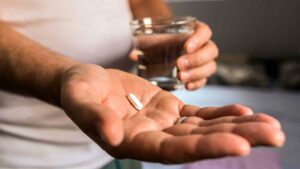Living with diabetes requires a comprehensive approach to treatment that goes beyond just managing blood sugar levels. One of the groundbreaking medications in this realm is Jardiance. In this blog, we’ll delve into the world of Jardiance diabetes medication, exploring its mechanism of action, benefits, and potential side effects. Join us on a journey to better understand this medication and discover how it can play a crucial role in empowering individuals with diabetes to lead healthier lives.
Contents
Is Jardiance A Good Medicine For Diabetes?
 Jardiance (empagliflozin) has emerged as a valuable and effective medication in the management of diabetes. It belongs to a class of drugs known as sodium-glucose co-transporter 2 (SGLT2) inhibitors. What sets Jardiance apart is its unique mechanism of action. This involves blocking the reabsorption of glucose by the kidneys, leading to increased excretion of glucose in the urine. This not only helps lower blood sugar levels but also contributes to weight loss and reductions in blood pressure.
Jardiance (empagliflozin) has emerged as a valuable and effective medication in the management of diabetes. It belongs to a class of drugs known as sodium-glucose co-transporter 2 (SGLT2) inhibitors. What sets Jardiance apart is its unique mechanism of action. This involves blocking the reabsorption of glucose by the kidneys, leading to increased excretion of glucose in the urine. This not only helps lower blood sugar levels but also contributes to weight loss and reductions in blood pressure.
Clinical studies have demonstrated the efficacy of Jardiance in improving glycemic control for individuals with type 2 diabetes. Additionally, it has shown cardiovascular benefits by reducing the risk of major cardiovascular events in those with established cardiovascular disease. While like any medication, Jardiance may have potential side effects, its overall positive impact on blood sugar management and potential weight loss makes it a favorable option for many individuals with diabetes.
Who Should Not Take Jardiance?
Jardiance diabetes medication may not be suitable for everyone. And, there are certain contraindications and precautions that individuals should be aware of. It is important to consult with a healthcare professional before starting or discontinuing any medication. Here are some key considerations:
- Allergy or Hypersensitivity: Individuals who have a known allergy or hypersensitivity to empagliflozin or any of the other ingredients in Jardiance should not take this medication.
- Severe Renal Impairment: Jardiance is not recommended for individuals with severe renal impairment or end-stage renal disease, as it may not be as effective in such cases.
- Type 1 Diabetes: Jardiance is specifically indicated for the treatment of type 2 diabetes and is not intended for use in individuals with type 1 diabetes.
- Ketoacidosis: People with a history of ketoacidosis or those with signs or symptoms of ketoacidosis. Such as abdominal pain, nausea, vomiting, fatigue, or difficulty breathing, should avoid Jardiance.
- Dehydration: Jardiance can increase the risk of dehydration. Particularly in individuals taking diuretics or those with conditions that predispose them to dehydration. Caution is advised in such cases.
- Pregnancy and Breastfeeding: The safety of Jardiance during pregnancy and breastfeeding has not been well studied. And it is generally not recommended for use in these situations. Pregnant or breastfeeding individuals should discuss alternative treatment options with their healthcare provider.
Always inform your healthcare provider about your complete medical history, existing health conditions, and any medications or supplements you are taking before starting a new medication like Jardiance. This information helps your healthcare provider make an informed decision about whether Jardiance is suitable for you and how to monitor your health during its use.
How Does Jardiance Diabetes Medication Work?
 Jardiance (empagliflozin) is a medication classified as a sodium-glucose co-transporter 2 (SGLT2) inhibitor. Thus, its mechanism of action is centered on the kidneys. To understand how Jardiance works, it’s helpful to know the normal process of glucose reabsorption in the kidneys.
Jardiance (empagliflozin) is a medication classified as a sodium-glucose co-transporter 2 (SGLT2) inhibitor. Thus, its mechanism of action is centered on the kidneys. To understand how Jardiance works, it’s helpful to know the normal process of glucose reabsorption in the kidneys.
In a healthy individual, the kidneys filter the blood to remove waste and excess substances, including glucose. However, most of the filtered glucose is reabsorbed back into the bloodstream by the renal tubules. SGLT2 is a protein responsible for the reabsorption of glucose in the kidneys. Jardiance specifically inhibits the action of SGLT2, preventing the reabsorption of glucose and allowing it to be excreted in the urine.
By blocking the reabsorption of glucose, Jardiance helps to lower blood sugar levels in people with type 2 diabetes. This unique mechanism of action is independent of insulin and works to eliminate excess glucose from the body through urine. Additionally, the increased excretion of glucose leads to a reduction in calorie absorption, contributing to potential weight loss. Beyond its glucose-lowering effects, Jardiance has shown cardiovascular benefits in clinical studies.
What Are The Benefits You Can Expect?
Jardiance offers several benefits for individuals with type 2 diabetes, making it a valuable addition to diabetes management. Here are some key benefits you can expect:
- Blood Sugar Control: Jardiance helps lower blood sugar levels by inhibiting the reabsorption of glucose in the kidneys. This mechanism of action is independent of insulin and can be especially beneficial for people with type 2 diabetes who may have insulin resistance.
- Cardiovascular Benefits: Clinical studies have demonstrated that Jardiance provides cardiovascular benefits, reducing the risk of major cardiovascular events in individuals with established cardiovascular disease. This includes a decreased risk of heart attack, stroke, and cardiovascular-related death.
- Blood Pressure Reduction: Jardiance has been associated with a mild reduction in blood pressure. This can be beneficial for individuals with hypertension. Lowering blood pressure contributes to overall cardiovascular health and reduces the risk of related complications.
- Potential Weight Loss: The increased excretion of glucose in the urine leads to a loss of calories, which can contribute to weight loss in some individuals. This can be particularly advantageous for those with diabetes who may also be working towards weight management.
- Renal Protection: Jardiance has demonstrated a potential protective effect on the kidneys, especially in individuals with type 2 diabetes and existing kidney issues. It may slow the progression of diabetic nephropathy and reduce the risk of adverse renal outcomes.
It’s important to note that individual responses to medications can vary. Thus, not everyone may experience the same benefits. Additionally, while Jardiance has several advantages, it’s essential to consider potential side effects and discuss with a healthcare professional to determine the suitability of this medication for your specific health needs.
What Are The Side Effects Of Jardiance Diabetes Medication?
 Jardiance diabetes medication is generally well-tolerated, but like any medication, it may cause side effects. It’s important to be aware of potential side effects and promptly report any concerns to your healthcare provider. Common side effects include:
Jardiance diabetes medication is generally well-tolerated, but like any medication, it may cause side effects. It’s important to be aware of potential side effects and promptly report any concerns to your healthcare provider. Common side effects include:
- Genital Yeast Infections
Jardiance may increase the risk of genital yeast infections, particularly in women. Symptoms may include itching, redness, or discomfort in the genital area.
- Urinary Tract Infections (UTIs)
Some individuals may experience an increased risk of urinary tract infections. Symptoms can include pain or a burning sensation during urination, frequent urination, or cloudy urine.
- Increased Urination
Due to its mechanism of action, Jardiance can lead to increased urine production, which may result in more frequent urination.
- Dehydration
Jardiance can contribute to dehydration, especially in individuals taking diuretics or those with conditions that predispose them to dehydration. Symptoms may include dizziness, lightheadedness, or fainting.
- Hypotension (Low Blood Pressure)
Jardiance may cause a mild reduction in blood pressure. Individuals taking medications for hypertension should be monitored for potential hypotensive effects.
- Ketoacidosis
While rare, Jardiance has been associated with an increased risk of ketoacidosis, a serious condition characterized by high levels of ketones in the blood. Symptoms may include nausea, vomiting, abdominal pain, fatigue, and difficulty breathing.
It’s essential to note that individual responses to medications vary, and not everyone will experience these side effects. Additionally, serious side effects are uncommon, and the benefits of Jardiance in managing diabetes and reducing cardiovascular risk often outweigh the potential risks. Always discuss any concerns or symptoms with your healthcare provider, and do not discontinue the medication without consulting them.
Is Jardiance Safe For Kidneys?
This medication has shown to be generally safe for the kidneys and may even have protective effects. Particularly in individuals with type 2 diabetes and existing kidney issues. The medication has been associated with a reduction in the risk of adverse renal outcomes and a potential slowing of the progression of diabetic nephropathy. By inhibiting the sodium-glucose co-transporter 2 (SGLT2) in the kidneys, Jardiance allows for increased glucose excretion in the urine. This may alleviate some of the stress on the kidneys associated with diabetes.
However, as with any medication, individual responses can vary. So, healthcare providers need to monitor kidney function regularly in individuals taking Jardiance, especially in those with pre-existing renal conditions. While Jardiance can be beneficial for many individuals, it is crucial to consider certain factors before prescribing it, such as existing renal impairment. In cases of severe renal impairment or end-stage renal disease, Jardiance may not be recommended due to potential diminished efficacy.
Conclusion
In conclusion, Jardiance diabetes medication stands out as a promising medication for individuals managing type 2 diabetes, offering a multi-faceted approach to better health. By inhibiting glucose reabsorption in the kidneys, Jardiance helps control blood sugar levels, contributing to improved overall well-being. Beyond its primary function, the medication has demonstrated cardiovascular benefits and potential weight loss.
While potential side effects exist, regular communication with healthcare providers is crucial for addressing concerns and ensuring a tailored approach to treatment. Do you want to get rid of diabetes? Join our online diabetes treatment program and reverse Diabetes naturally through lifestyle changes such as a Personalized Diet plan, Exercise, Yoga, dieticians, and health coaches.

